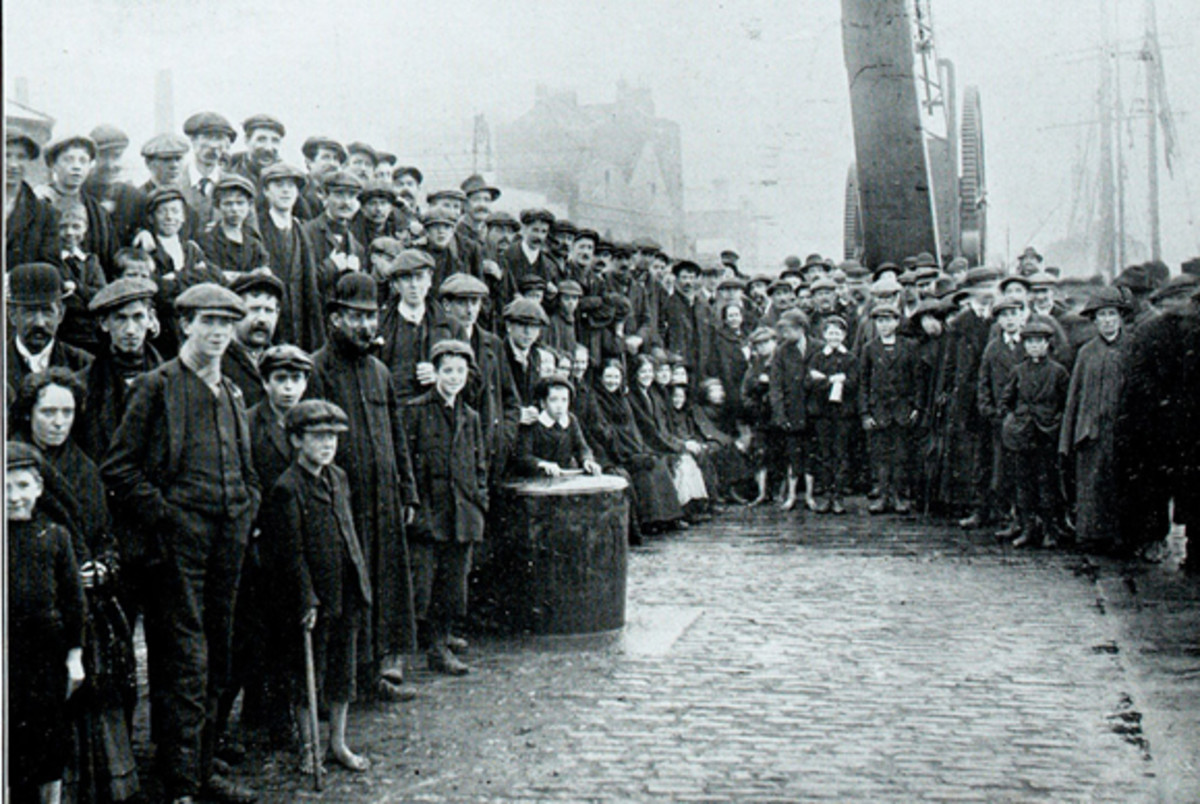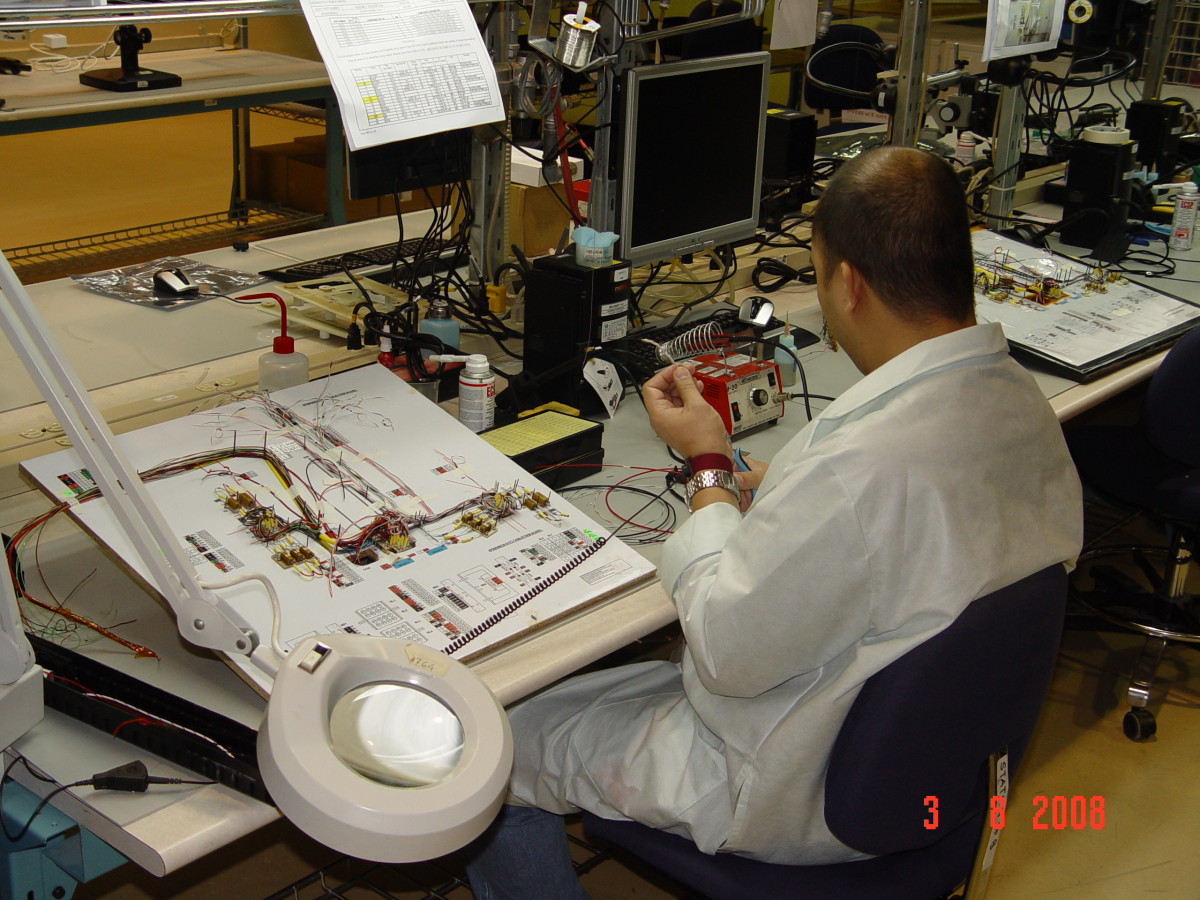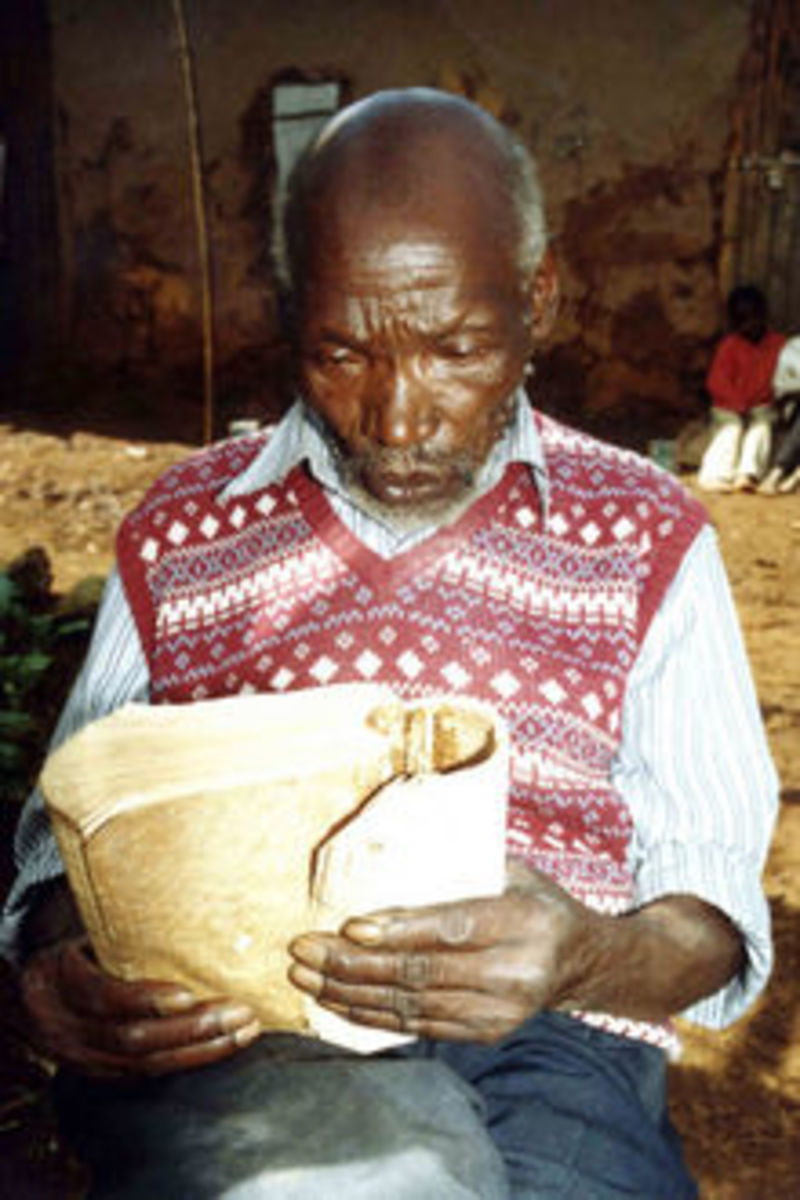A Few Words About Diamonds - A Girl's Best Friend - and the Kimberley Process
Diamonds - Sweetness and Light?
The films tell us that 'Diamonds are Forever' and 'Diamonds are a Girl's Best Friend' ~ and, certainly, diamonds are indeed beautiful ~ but is everything about them sweetness and scintillating light?
It seems not!!!
Conflict Diamonds and the 'Kimberley Process'
The 'Kimberley Process' is an international initiative, set up by governments, industry and civil society, in order to attempt to prevent diamonds from being used to finance horrific conflicts and illegal wars. In such cases, they are named 'blood diamonds' or 'conflict diamonds'.
De Beers, self proclaimed 'leading global Diamond Authority' and 'guardian of the diamond dream' are members of the 'World Diamond Council' and have taken part in a number of Kimberley Process Review Missions and other meetings. They state that they 'played a pivotal role in the development of the Kimberley Process'.
The Kimberley Process attempts to certify those diamonds which are ‘conflict-free’. Participating countries pass the necessary legislation to enforce the Kimberley Process and then they trade with other participating countries.
Kimberley Process
South Africa's Diamonds
Kimberley Process Stumbling?
However, in spite of this process, 'conflict diamonds', or 'blood diamonds', may still find themselves included with legitimate diamonds, as weaknesses in the implementation of the scheme exist in certain places at certain times.
According to a recent item by Rupert Taylor, ('Blood Diamonds and the Kimberley Process' ~ August 2nd, 2010) the Kimberley Process is 'stumbling'.
'Partnership Africa Canada (PAC)' claims that 'Several African wars ... have been financed by the mining and selling of diamonds'.
The African continent, particularly Angola, Botswana and South Africa, provides the world with most of its diamonds. According to 'MBendi.com' Information Services, Africa produces 'as much as 50% of global production' and 'to date, Africa has produced over 75%, in value, of the world's diamonds with more than 1.9 billion carats ... mined'.
[Read more at Suite101: Blood Diamonds and the Kimberley Process http://www.suite101.com/content/blood-diamonds-and-the-kimberley-process-a269131#ixzz105HmsPeZ]
BBC: Does the Kimberley Process work?
The BBC news site contains a piece on this issue, dated 28 June 2010:
'Diamonds: Does the Kimberley Process work?' ~ By James Melik (Reporter, Business Daily, BBC World Service)
Some quotes from that:
"There have been reports and overwhelming evidence of serious human rights abuses taking place in the Chiadzwa diamond fields.” [Farai Maguwu ~ Human rights campaigner]
"We want to give comfort to the consumer that the diamonds they have bought have come from legitimate sources and they can wear it with pride and with love” [Ernest Blom ~ Federation of Diamond Bourses]
What About Working Conditions, Etc?
DeBeers, the long-standing member of the diamond-producing community, has its detractors.
According to showcaves.com: 'Today it seems, diamonds are the monopoly of one single company which controls virtually all diamonds on Earth [DeBeers]. Such a situation is always good to produce jealousy in the competitors, but also despotism and exorbitant prices by the monopolist. A common accusation against De Beers is the way the company treats its workers.'
So, are the criticisms genuine, or the result of jealousy??
Is the company harsh towards its work force ~ or simply strict, because of the nature of the product?
The potential for theft must be a persistent problem in the diamond industry. Diamonds can be tiny and easily hidden. They are valuable and worth a lot of money. The mine workers are generally poor ~ taking one small stone must be quite a temptation for some of them.
Criticism of Some of DeBeers Working Conditions
Janine F. Roberts produced an illustrated piece, in around 2002, called 'Working Conditions in De Beers diamond mines - Koffiefontein'.
She writes that 'Koffiefontein is a major De Beers diamond mine tightly wrapped in much secrecy and security' and she describes: 'lower levels' of the mine being 'excavated ... with tunnels underneath the pit', which cause the pit floor to 'collapse'; 'dust storms' being blown into the mines, seriously inhibiting the view of unprotected miners and potentially damaging their health; 'deadly asbestos dust' being 'everywhere' and a 'ventilation system' which has 'frequently broken down'.
Roberts also recounts a story that was told to her, about a child who found a diamond, while playing in a pretty valley, near the shanty town inhabited by the low-paid Black workers and their families. The diamond was confiscated, because no-one may keep a 'lucky find' ~ at the risk of going to prison, and the valley, where children had loved to play, was filled in 'with rocks, earth and heavy rubbish'.
Allegedly, 'If De Beers did not want this .. place mined, it was not to be mined'.
Is this true, or legend?
Koffiefontein - Since Then?
Whatever was happening at Koffiefontein back then, it may be more useful to know what has been happening in the intervening years,
Some quotes on the subject should fill us in well enough:
20th January, 2006
'De Beers Consolidated Mines (DBCM) today announced the imminent closure of its Koffiefontein Mine in the Free State Province.'
' .. Koffiefontein Mine has been operating at a significant loss since 2001 ...'
'DBCM will now commence consultations with the 329 employees and the National Union of Mineworkers .... These consultations will seek measures to ameliorate the adverse effects of retrenchments and could include the provision of learnerships which include training in other sectors'.
http://www.debeersgroup.com/en/Media-centre/Press-releases/2006/De-Beers-Consolidated-Mines-to-close-Koffiefontein-Mine/
*
Thursday, December 21st 2006
'Petra Diamonds ... has been granted the mining right for the Koffiefontein diamond mine .....
'The AIM listed company has concluded a joint venture agreement with its Koffiefontein Black Economic Empowerment (BEE) partners ...'
http://www.miningtopnews.com/petra-granted-koffiefontein-mining-right.html
*
London, June 29, 2007 ...
The acquisition of Koffiefontein from De Beers Consolidated Mines Limited .. is expected to be completed shortly. ...
Adonis Pouroulis, Chairman of Petra, commented '... we look forward to returning the mine to production, an important development for the local Koffiefontein community ....'
http://www.abnnewswire.net/press/en/37327/Petra_Diamonds_Limited_Announces_Update_On_Koffiefontein_Mine
*
7 July 2009
Trading update - Koffiefontein mine – South Africa
'.... reduced production at Koffiefontein (now rectified) ...'
Petra has a 70% interest in the Koffiefontein mine, BEE partners 30%
http://www.petradiamonds.com/im/press_display.php?Id=2009/07jul09
Black Economic Empowerment
Petra and Black Economic Empowerment
Petra's website explains that it is an independent mining group company ~ a supplier of rough diamonds ~ and that 'Petra conducts all its operations according to the highest ethical standards and will only work in countries which are members of the Kimberley Process'.
*
A definition of Black Economic Empowerment is given on Wikipedia:
'Black Economic Empowerment (BEE) is a program launched by the South African government to redress the inequalities of Apartheid by giving previously disadvantaged groups .... economic opportunities previously not available to them.'
http://en.wikipedia.org/wiki/Black_Economic_Empowerment
'Petra' quote from here;
http://www.petradiamonds.com/a/profile.php
Koffiefontein
But there is more ..
With the risk of cave-ins, mud-slides, potential poisoning from pollution, etc, and long hours of work for low pay, mining conditions can be very hazardous at the best of times, and, in Africa, stories are heard of child slave labour, the cold-blooded shooting of illegal miners, the spread of HIV / AIDs caused by the Wild West mining mentality, etc, etc.
In the article 'A look at the work conditions at diamond mines in Africa', Morgan Lowrie writes:
'Many of the diamonds on the market today come from Africa, where a large percentage of the workers toil in subhuman conditions in order to locate those elusive gems. Although diamonds are a multi-billion dollar industry for Africa, many of those workers dwell in a deep poverty from which they will never escape. ...'
'Despite the success of the Kimberley process, the diamond industry is still not an ethical one. Miners, especially small-scale artisanal diggers, work in an environment which is fraught with dangers, rife with abuse, and which often amounts to little more than servitude.'
Sierra Leone
An Upside?
But Lowrie also sees an upside to this industry:
'Diamond mining does not always have to be a tale of exploitation and tragedy. The $8.4 billion dollars worth of diamonds which leave Africa every year have managed to provide thousands of legitimate jobs and have helped some nations to escape poverty. ..... Botswana in particular has been a success story ... '
In the BBC item 'Sierra Leone relearns diamond mining', Will Ross writes that 'In a wooden hut ... 20 men struggle with a two hour Diamond Identification and Classification exam'.
One of the men, Komba Mejor, says "I now understand more about the value of the diamonds and if I pass the exam I will teach my brothers and sisters so we can get more money from the diamonds".
Ross continues 'This is all part of a programme funded by USAid, aimed at helping the miners gain a better understanding of the industry and avoid being ripped off by middlemen'.
Helping them to escape the 'Grim Reality'
It is from the type of 'grim reality', described in Petra Cahill's article 'A diamond's journey: Grim reality tarnishes glitter' that they are trying to protect the miners. (Updated June 2009)
She opens her article by saying ' The search for diamonds is not exactly easy. Many miners and diamond diggers in sub-Saharan Africa travel great distances to find work and submit to gruelingly long hours for low wages – or sometimes no wages – in substandard conditions. The informal mining industry is where workers tend to be most exploited'.
Travis Molina, in his article 'Diamonds Are Forever, But Not The Lives Of Child Workers', states: 'Mines in South Africa and India are notorious locations of various sweatshops that produce exquisite diamonds that were made by the hands of child slaves.'
Facets of the Diamond: Wisdom of India
India
As Travis Molina indicated, India also plays a major part of the diamond industry.
Western India is where the majority of the world's diamonds are cut and polished. However, the workers are low-paid, receiving only a fraction of a percentage of the value of the diamonds that they cut.
Worse; in 1997, the 'International Confederation of Free Trade Unions' claimed that child labour was prospering there.
We can only hope that things are now improving there ~ but are they?
In the beginning
This information is gleaned from 'DIAMONDS, GOLD, AND SOUTH AFRICA ~ Diamonds and De Beers' by U C Davis (Updated March 2000).
A 21 carat diamond was found near the Orange Rover, in South Africa, in 1867 ~ and soon the 'diamond rush' began!
By 1880, the politician Cecil Rhodes (after whom Rhodesia was named) was a member of a 7-person partnership, which owned 90 claims in African diamond mines. Their holdings were on land which had once been the De Beers ranch, so the partnership was named 'the De Beers Mining Company Ltd'.
Being a politician, Rhodes was in a position to protect the mining companies. They paid a low rate of tax, and the Diamond Trade Act protected them from theft of their assets.
As UC Davis writes, 'it also set two very dangerous social precedents'.
~ One was that anyone who happened to have an uncut diamond was simply assumed to be a thief.
~ The second was what Davis called 'the first apartheid'.
The 'First Apartheid'
The 'Diamond Trade Act' allowed for "searching-houses'". The company police carried out 'surveillance, searching and stripping'.
As a result of strikes by white workers, they started to be treated more leniently than black workers and, eventually, separate 'segregated' compounds were erected, for Blacks, where their activities could be 'controlled'.
* * *
De Beers Consolidated Mines Limited
The company, 'De Beers Consolidated Mines Limited', was founded in Kimberley, in 1888, unifying all of the main mines ~ virtually a world monopoly.
The major holdings were in the hands Cecil Rhodes, plus the Barnato and Rothschilds families.
Were DeBeers right to assume that there were thieves in their midst?
According to Davis's research;
'After De Beers set up its "searching-houses" in March 1883, its diamond production rose significantly, showing that there had been a hemorrhage of diamonds ..'
One wonders whether the impoverished local Black Africans, whose land was being mined by people from other continents, considered it to be theft?
The Legend of the Found Diamond
In 'Diamond Mines Of South Africa', published in 1911, the author elaborates on the find of 1867, but also adds that an American traveller is said to have found a diamond alongside the Orange River in 1859.
Apparently, a little Boer boy liked to collect stones near his home in Hopetown, along the Orange River.
One stone was particularly attractive, and his mother mentioned it to a neighbour, who found it interesting and offered to buy it. She accepted no money, but simply gave it to him.
The stone eventually reached the hands of Dr. Guibon Atherstone, a mineralogist in Grahamstown.
Atherstone confirmed that the pretty stone was, in fact, a diamond of around 22 to 24 carats.
What now?
That is how the story of the African diamond rush is supposed to have begun.
But what now?
I admit to be hugely ignorant on this subject. I hear whisperings from time to time and I read, or watch, occasional news items, but I don't know the full story of the jourmey of a 'modern' diamond.
How can we be sure that, by purchasing diamonds, we are not contributing to someone's pain?
How can we be sure that, by not purchasing diamonds, we are not contributing to someone's poverty?
How do we know what is really going on?
Should we boycott the diamond industry?
Should African diamond miners cease working?
Winnie Mandela's Suggestion - Good or Bad Advice?
Apparently, Winnie Mandela told black miners:
"You hold the golden key to our liberation. The moment you stop digging gold and diamonds, that is the moment you will be free."
But U C Davis disagrees. Without the mines, Davis believes that there would be 'economic disaster' and that this would be 'visited most on the poorer section of society, the blacks'.
Diamonds and Crime
Wishing and Hoping
Perhaps all that we can do is support the 'Kimberley Process' and let it be known that we want better working conditions and rates of pay for mine workers.
Hopefully things are improving, day by day, in spite of criminal, or unethical, parties.
It would be good to think that, one day, the ordinary working people of the African continent will truly be able to share in, and benefit from, its mineral wealth.
* * *
And then we see this! - Zimbabwe
Monday, 20 April 2009
'Profiting from Zimbabwe's 'blood diamonds'
'A BBC investigation in Zimbabwe has uncovered evidence that senior people around President Robert Mugabe are benefiting from the sale of illegal diamonds.
'World Affairs Editor John Simpson has just returned from a visit to Marange, in eastern Zimbabwe, which contains the largest known concentration of diamonds in the world.'
http://news.bbc.co.uk/1/hi/world/africa/8007406.stm
Zimbabwe Diamonds - News Quotes:
'Zimbabwe to escape censure over abuses in diamond mines'
'Key witness threatened as Mugabe regime mounts lobbying campaign'
By Daniel Howden, Africa Correspondent
Wednesday, 4 November 2009
'Zimbabwe looks set to escape any punishment over its trade in blood diamonds after a ruthless lobbying campaign by the Mugabe regime ...'
http://www.independent.co.uk/news/world/africa/mugabe-threats-see-him-escape-sanction-over-blood-diamonds-1814190.html
*
'Mugabe's blood diamonds'
May 30, 2010 By Zoli Mangena, Jonathan Clayton and Jan Raath
'The illegal diamond trade in Zimbabwe is believed to be the single biggest source of "blood - or conflict - diamonds" in the world and one of the last cash lifelines of President Robert Mugabe and his cohorts.'
http://www.timeslive.co.za/africa/article476644.ece/Mugabes-blood-diamonds
*
'Mugabe's darkest secret: An £800bn blood diamond mine he's running with China's Red Army'
By Andrew Malone. 18th September 2010
http://www.dailymail.co.uk/news/worldnews/article-1313123/Robert-Mugabes-darkest-secret-An-800bn-blood-diamond-run-Chinas-Red-Army.html#ixzz107IjuERW
*
Note:
'Zimbabwe' was once known as 'South Zambezia', but, in 1895, it was re-named 'Southern Rhodesia', in honour of Cecil Rhodes, British politician, director of the British South Africa Company and a founding member of De Beers.
Zimbabwe
Sources and additional reading:
http://www.kimberleyprocess.com/
http://www.globalwitness.org/pages/en/the_kimberley_process.html
http://www.bbc.co.uk/news/10307046
http://www.hrw.org/en/news/2010/06/20/kimberley-process-halt-zimbabwe-diamond-trade
http://www.debeersgroup.com/kimberleyprocess
http://www.mbendi.com/indy/ming/dmnd/af/p0005.htm
http://ihscslnews.org/view_article.php?id=162
http://www.helium.com/items/1371951-a-look-at-the-work-conditions-at-diamond-mines-in-africa
http://news.bbc.co.uk/1/hi/business/6185053.stm
http://www.msnbc.msn.com/id/15842524/
http://ihscslnews.org/view_article.php?id=162
http://www.debeers.com/page/home
http://www.showcaves.com/english/explain/Mines/Diamond.htmlhttp:http://mygeologypage.ucdavis.edu/cowen/~gel115/115ch15diamonds.html
http://en.wikipedia.org/wiki/Child_labour_in_the_diamond_industry#cite_note-BBCBusiness-1
http://www.helium.com/items/1613134-diamond-mining-in-africa
http://www.helium.com/items/1390501-history-of-blood-diamonds
http://www.alertnet.org/db/blogs/26088/2007/08/4-171316-1.htm
http://www.timeslive.co.za/africa/article476644.ece/Mugabes-blood-diamonds
http://www.independent.co.uk/news/world/africa/mugabe-threats-see-him-escape-sanction-over-blood-diamonds-1814190.html
http://www.independent.co.uk/news/world/africa/mugabe-threats-see-him-escape-sanction-over-blood-diamonds-1814190.html
http://news.bbc.co.uk/1/hi/world/africa/8007406.stm
http://www.dailymail.co.uk/news/worldnews/article-1313123/Robert-Mugabes-darkest-secret-An-800bn-blood-diamond-run-Chinas-Red-Army.html#ixzz107IjuERW





















